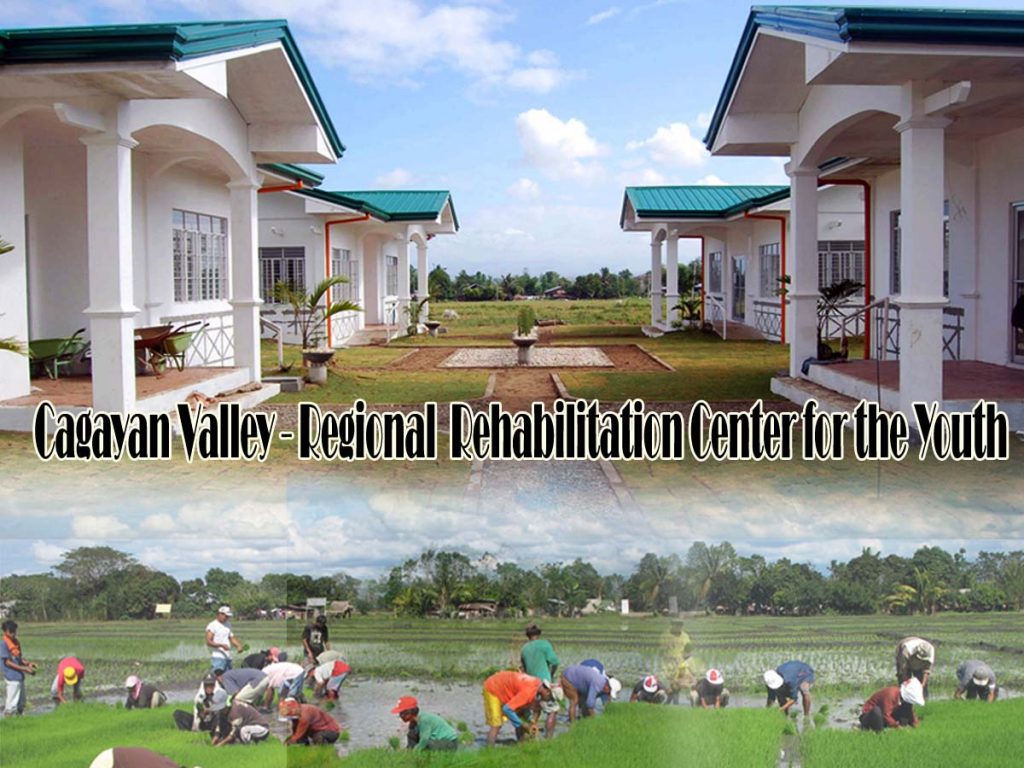Brief History: CV-RRCY
In 1992, a 13.5 hectares agricultural land property in Roma Norte, Enrile, Cagayan was turned over to the Department of Social Welfare and Development by the Department of Agrarian Reform for the establishment of a community farm park facility for out-of-school youth, Children in Conflict with the Law and other disadvantaged children. The DSWD agreed to pay for the use, maintenance and improvement undertaken in the property.
The Roma Norte Agro-Forestry Farm Park Development Project for CICL and other Youth at Risk of Region 02 which is now known as the Cagayan Valley-Regional Rehabilitation Center for Youth (CV-RRCY) and presently has a total land area of 8.8 hectares was converted into an agro-forestry farm where disadvantaged children can learn agricultural techniques on the DAR’s Integrated Demonstration Farm for Livelihood opportunities.
CV-RRCY is unique among all other youth rehabilitation centers for it is ecologically-friendly and self-sufficient environment for the residents and workers. It is manage by DSWD Field Office-02 and as a managing agency; it will regularly coordinate and cooperate with other sectors involved in the project such as the LGUs, NGOs and various line departments.
Description of the RRCY
RRCY is a twenty-four hour residential center for the rehabilitation of youth offenders aged below 18 years of age whose sentences has been suspended. It is a facility designed to provide intensive care treatment in a residential setting for the rehabilitation of a CICL whose sentence has been suspended. It also serves as a nurturing out-of-home placement for children in need of rehabilitation.
There are eleven (11) operational youth rehabilitation centers in the country which are located in the following regions: NCR, I, III, VI, VII, VIII, IX, X, XI and CARAGA.
General Objective:
To enhance the traditional residential care facilities and techniques in the rehabilitation of vulnerable youth and children in conflict with the law.
Specific Objectives:
The rehabilitation center aims to economically and socially integrate the beneficiaries into a mainstreamed livelihood, psycho-social and environmental development process by specifically achieving the following results:
- Developed an Agro-Forestry Farm Park that would encourage a self-
sustaining and conducive rehabilitation community/environment for the residents.
- An improved strategy for rehabilitation of vulnerable youth and CICL is
tested and operationalized in the farm park community and replicated in other areas/regions
- Residents are assisted to fully appreciate the concept of ecologically
friendly activities and the value and importance of forestry and agriculture in social progress and food security.
- Capacity and skills potentials of residents are identified and developed
or their eventual reintegration to their respective families/communities.
Who are the Clients Served?
Residential rehabilitation shall be limited to the youth who are committed by the Court for rehabilitation due to the following circumstances:
a. they have committed serious offenses that they constitute a threat to the community
b. their life is threatened/at risk if placed in the community
c. nobody in the community can provide support for their rehabilitation
Programs & Services:
1. Home Life Services/Group
Provide a home environment and group living arrangement with well-balanced, organized and non-formal activities for the youth.
2. Treatment Interventions
Provide comprehensive interventions for the rehabilitation of youth offenders which are primarily carried out by an interdisciplinary team composed of social worker, psychologist, houseparent and in some instances, a psychiatrist. .
3. Support Services/Interventions
Provide competency and skills development, vocational training livelihood and
productivity program, socio-cultural and recreational program, spiritual enhancement
program and other skills training to expand their sense of responsibility and community
involvement.
GENERAL POLICIES
Admission Policies:
- Admission to the RRCY is limited to a CICL aged above 15 years old and below 18 years old who are ordered by the court to undergo rehabilitation.
- A CICL who was referred by court for rehabilitation must present a commitment order issued by the committing court to the DSWD prior to admission.
Admission Procedures:
The admission officer who is either the social worker or the houseparent on duty shall do the following:
a. Check the duly accomplished Individual Admission Slip and court order;
b. Gather/Validate from CICL’s accompanying responsible and authorized adult:
i. Bureau of Jail Management and Penology Officer
ii. Local Social Welfare and Development Officer
iii. Parents/Relatives
- Upon admission, body search/inspection and inventory of personal belongings is
conducted by the appropriate authority
d. Safekeep valuable belongings of the CICL.
e. Assign the CICL to an appropriate room/cottage based on the initial
assessment and recommendations of the social worker
f. Introduce the newly admitted CICL to other staff and peers, make him
comfortable and welcome
g. Conduct orientation on home’s policies, house rules, programs and services
h. Refer admitted CICL to the medical service unit or a doctor for physical/medical
examination.
i. Ensure that immediate needs of the CICL such as food, clothing and other supplies
for personal care are Provided.
What are the Requirements for Admission?
- Court Order duly signed and dry sealed by the court that has jurisdiction over the case; committing the youth to the center;
- Physical examination/certification issued by the Medical Officer who conducted the examination on the youth immediately after arrest as provided for in Article 190 of P.D.;
- Social Case Study Report prepared by the local DSWD social worker who handled the case during the pre-trial and dispositional hearings;
- Consent of parents for youth’s medical examination or hospitalization while in care at the Rehabilitation Center;
- School records or permission to transfer school;
Case Management:
This is a process of enabling persons to mobilize resources (internal and external) to achieve a desired outcome level (behavioral and/or environmental change).
Steps in Case Management:
- Intake and assessment–intake interview is an initial diagnostic process undertaken
by the social worker.
B. Formulation of Treatment Plans
C. Implementation of Treatment Plan
D. Case Conference
E. Case Termination/Discharge Planning
F. After-Care Service
Shirley A. Labuguen
Center Head


